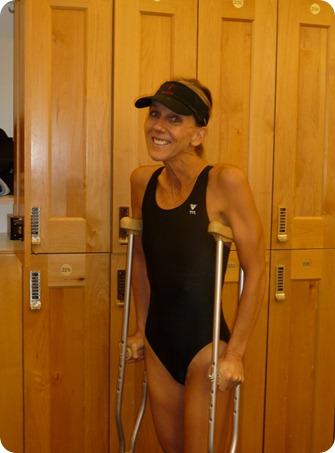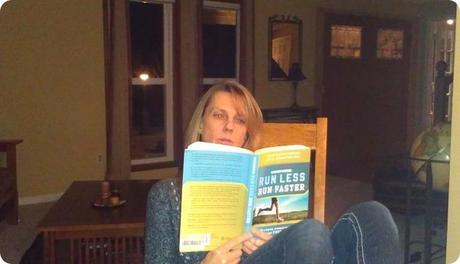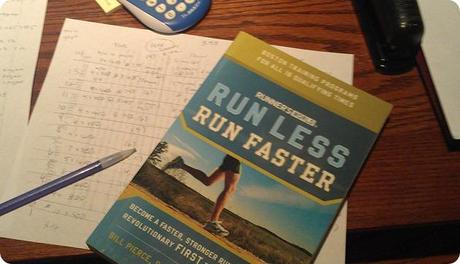It seems like forever since I’ve trained for a marathon. It feels so amazingly good to be back.
When I got sidelined back in October 2010 with a femoral stress fracture (left hip) I was in the middle of tapering for what was going to be my marathon yet (or so I thought). With the results of that MRI, I was heart broken - just like so many of you have been when you’ve had to give up on races you trained so hard for.
I cried, drank wine, yelled obscenities at other runners, felt sorry for myself and watched bad TV. Then, I started fighting because having goals and doing anything that made me feel the tiniest bit athletic was my salvation. Plus, I had qualified for Boston a few months earlier and no way in hell was I giving up my spot.
What did I do? As soon as I could, I hobbled on my crutches onto the deck of the indoor pool, got in the water and ran. Almost every stinking day.

I am smiling but whispering “this mother eff’ing sucks the big one.”
I hated it. But it kept me in shape. So many times I almost threw in the towel and gave up hope that I would be recovered in time. My PT even told me to forget about marathon training, I would not be healed and it wouldn’t be smart. I pressed on anyway. Five months later and with very little training (one long run of 15 miles and a bunch of other junk miles) I ran Boston. It was my slowest marathon (4:08) by far, but I did it.
It was a great comeback story – someone really should have made a Lifetime movie out of it. Only, I would have to have had an abusive husband stalking me around the marathon course and a bottle of Oxycontin stashed in my running skirt along with a gun and a ransom note.
But, what I’m here to tell you is this – running injuries are no joke. It takes a long ass time to truly heal, to stop compensating, to be 100%. You can train and race like I did, and you can do pretty well at it. But, those damn post-race injury blues and aches and pains haunt you.
I don’t know if I’m 100%, but I finally feel ready to start marathon training again (for this race in May). I’m hoping my body holds up well, but if it doesn’t, I’ll go to plan B (half marathon). The plan I’ve had the most success with in the past is this one:

It was with a plan of running three days a week and doing lots of cross training (mostly swimming and Bikram yoga) that I was able to qualify for Boston. My body does not like running more than three to four times per week. My body does not like running over 40 miles per week. I accept this as my fate as a runner. I am 45 and have been running for four years. I know I’m limited. But that doesn’t mean I can’t be a successful runner.

So, I take out my pencil and scrap paper and hatch a 14 week plan that will start on .
What makes a good marathon training plan? Whether you have a coach, are following a plan from a book or online sources or are creating your own, there are a few components I think a plan should have, especially if you are a newer or first time marathoner. You can disagree, but this is my blog and this is what I think.
- It should make you excited (not fearful and like you want to crap yourself) when you look at it.
- It should start you out very gradually. Your beginning mileage should be about what you are running right now per week, if not less.
- It should incorporate recovery weeks. I like my plans to have a recovery week every fourth week. I build for three weeks, cut back down for one week, then build again
- It should have at least one complete rest day per week (where you do nothing. No yoga, no burpees, no sex – well, maybe).
- It should build you up slowly – about 10% percent per week (mileage)
- It shouldn't incorporate speed work until you have a solid base built up (and Yasso 800s are the BEST).
- It should have you doing your long runs SLOW (like 60-90 seconds slower than marathon pace).
- It should enforce strength and cross training (or you will be burned at the stake).
- It should incorporate a decent pre-race taper period (when you will lose your mind but you will get much needed rest for the big day).
Just some of my thoughts/advice based on experience, reading, my coaching certification and common sense.
Are you training for a marathon now? Which one? Colfax Marathon in Denver on May 19. Join me!!
What is your best tip for marathon training? Rest, recovery and carry TP.
SUAR

